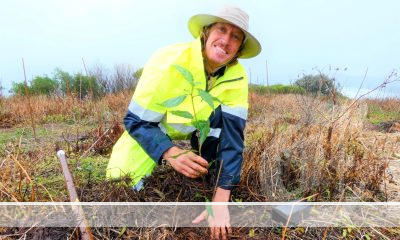HENDRA VIRUS CONFIRMED IN FLYING FOXES IN BROAD REGION OF AUSTRALIA
Scientists at CSIRO, Australia’s national science agency, have uncovered a new type of Hendra virus in flying foxes, confirming the virus can be found across a broad region of the country.
A paper detailing the findings has been published just days after the new genetic type (HeV-g2) was detected in a horse near Newcastle in New South Wales, the most southern case of Hendra yet recorded.
Hendra virus can be transmitted from flying foxes to horses, and from horses to people. Previous studies had found the virus in flying foxes in Queensland and parts of New South Wales. After monitoring flying fox samples from 2013-2021, researchers at CSIRO’s Australian Centre for Disease Preparedness (ACDP) found the new genetic type in flying foxes in Victoria, South Australia, and Western Australia.
Advertisements

ACDP is a World Organisation for Animal Health (OIE) reference laboratory for Hendra and Nipah virus diseases. Reference expert and CSIRO scientist Dr Kim Halpin said spillover of the disease from flying foxes to horses has still only been reported in Queensland and New South Wales.
“However, because Hendra Virus Genotype 2 is so genetically similar to the original Hendra virus, there is a potential risk to horses wherever flying foxes are found in Australia,” Dr Halpin said.
“It’s important to note that Hendra has never been reported to spread directly from flying foxes to humans – it’s always been transmitted from infected horses to humans. We expect this new genetic type would behave the same way.
“And given the similarities, while more research is needed, we expect the existing Hendra virus vaccine for horses should work against this new type too.
“This finding really underscores the importance of research into flying foxes – it’s crucial to helping us understand and protect Australians against the viruses they can carry.”
Another project, called “Horses as Sentinels”, led by the University of Sydney and CSIRO and funded by a Biosecurity Innovation Program grant from the Department of Agriculture, Water and the Environment, detected the same genetic type earlier this year in samples collected from a horse from Queensland in 2015. Results of this research are available in preprint. https://www.biorxiv.org/content/10.1101/2021.07.16.452724v3
Dr Steve Dennis, President of Equine Veterinarians Australia, said the findings are a reminder there’s a risk of Hendra virus wherever there are flying foxes and horses.
“Owners and any people who interact with horses can reduce the risk of infection from Hendra virus and other zoonotic viruses through vaccination of horses or humans where available, wearing appropriate PPE, and seeking veterinary attention for sick horses,” Dr Dennis said.
CSIRO and the “Horses as Sentinels” project team have been working closely with vets and laboratories around Australia to implement improved tests for horses with signs of Hendra virus disease.
More information for horse owners is available at: https://www.outbreak.gov.au/for-vets-and-scientists/hendra-virus
Peer-reviewed results of CSIRO’s flying fox study have just been published in Virology Journal.
More about the study:
• Previous studies suggested the black and the spectacled flying foxes were the primary carriers of Hendra virus. This study found the new genetic type of Hendra in grey-headed flying foxes in Victoria and South Australia, and in the little red flying fox in Western Australia, confirming the virus can be found in four species of flying fox and in a broad geographic range of Australia.
• The new genetic type was first detected in a flying fox sample from 2013, but with technology available at the time the researchers could not fully analyse its genome sequence to confirm its identity and understand its significance.
• By piecing together the new virus’ genome from several flying fox samples since then using the latest technology, they discovered it was indeed a new type of Hendra virus.
• Ninety-eight flying foxes tested negative to the original Hendra virus, but 11 were found to carry genetic material indicative of HeV-g2.
• Flying fox research is crucial to our understanding of the viruses they can carry, the factors that might lead to transmission, and steps we can take to minimise those risks.
Notes about horses and flying foxes
• To date, all human cases of Hendra virus infection have resulted from direct contact with infected horses. Direct transmission of Hendra virus from flying foxes to humans has not been observed.
• This finding is a reminder of measures that horse owners and people who work closely with horses can put in place to reduce the risk of infection from Hendra virus and other henipaviruses. This includes vaccination, wearing appropriate PPE, and seeking veterinary attention for sick horses.
• Flying foxes should only be handled by people who are appropriately vaccinated, trained, and wearing personal protective equipment. Injured or sick flying foxes should be reported to a wildlife care organisation or local veterinarian.
• Flying foxes are protected animals, with two species on our nationally vulnerable list. They are critical to our environment because they pollinate our native trees and plants and also spread their seeds.
• Without flying foxes, we wouldn’t have our eucalypt forests, rainforests and melaleucas.
• Biosecurity measures will help to minimise the risk of disease transmission, while protecting these important species and their role in maintaining a healthy environment.





 Tweed Shire News2 years ago
Tweed Shire News2 years ago
 Motoring News1 year ago
Motoring News1 year ago
 COVID-19 Northern Rivers News3 years ago
COVID-19 Northern Rivers News3 years ago
 COVID-19 Northern Rivers News3 years ago
COVID-19 Northern Rivers News3 years ago
 Northern Rivers Local News3 years ago
Northern Rivers Local News3 years ago
 Health News3 years ago
Health News3 years ago
 COVID-19 Northern Rivers News3 years ago
COVID-19 Northern Rivers News3 years ago
 NSW Breaking News3 years ago
NSW Breaking News3 years ago

































